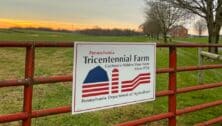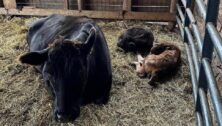Chester County Ag Notes – Mechanization Flips Farming
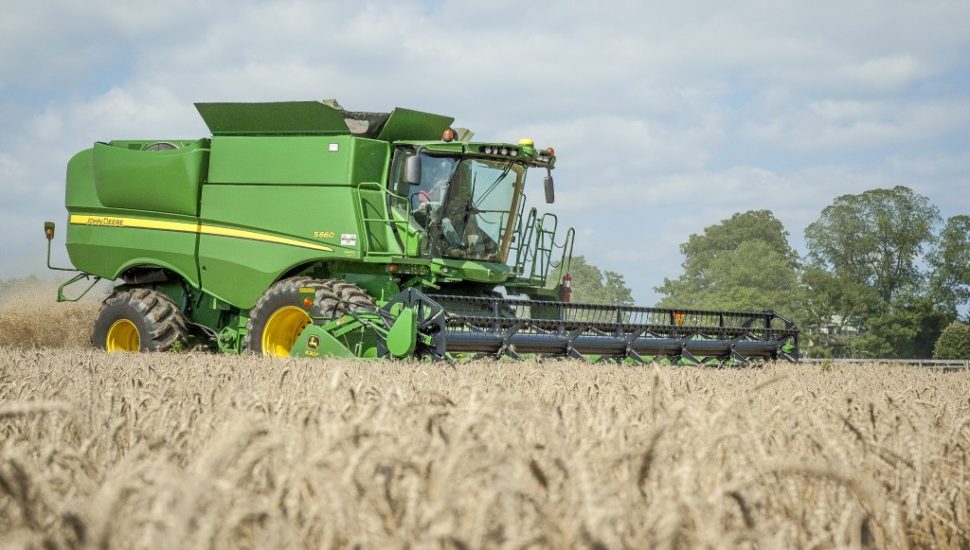
By Duncan Allison
For several hundred years horses and horsepower enabled farmers to get more work done and farm more acres. However horses are relatively labor intensive and required farmland for grazing and to grow hay.
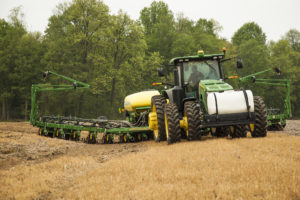 Farming has come a long way since those days. In the early 1900s one farmer produced enough food to feed a family of five whereas a farmer today provides food for 155 people. A major factor in this huge increase in productivity has been due to tractors and mechanization.
Farming has come a long way since those days. In the early 1900s one farmer produced enough food to feed a family of five whereas a farmer today provides food for 155 people. A major factor in this huge increase in productivity has been due to tractors and mechanization.
Tractors did not become widely used on farms until the 1930s. Since then tractors and their power take off capability have allowed virtually every operation on the farm to be mechanized.
Forty years ago 120 horsepower tractors were limited in their capability but today 150-250 hp is standard on dairy and smaller farms up to 300-400 acres and the typical tractor for a larger farm of 1000 acres is likely 300-350 hp.
For famers with thousands of acres they may need 620 hp which is the biggest tractor produced by both John Deere and Case Steiger.
Why do farms need such power and technology capability? Several reasons – the critical importance of timely field operations, lack of farm labor and the ability to farm more precisely and sustainably by using GPS and what is termed precision technology.
Most field farm work is seasonal and the weather influences being able to drill seed or harvest crops for example. A farm is a business and yet the farmer has no control of crop prices or the weather. Farm operations have to be carried out in the timeliest and most cost effective way.
Crop and milk prices vary each month – corn varied from $5.99 – 7.89 in 2012 and has been down around $3.70 in 2015. Milk also varies from the current $16.60/100lbs to over $23.00 in late 2014 and early 2015. This uncertainty and significant variability in commodity prices from month to month provide constant challenges to ensure profitability.
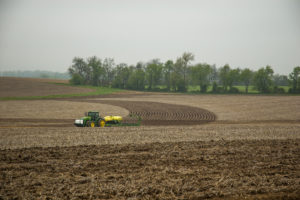 The weather needs little comment but both seeding and harvesting crops require dry conditions. Crop yields are heavily dependent on optimizing yields which means drilling the corn, for example, at the earliest possible opportunity as the window of opportunity is very narrow.
The weather needs little comment but both seeding and harvesting crops require dry conditions. Crop yields are heavily dependent on optimizing yields which means drilling the corn, for example, at the earliest possible opportunity as the window of opportunity is very narrow.
Similarly good weather at harvesting may require combining through the night to make sure of getting quality grain. The farmer must be able to take advantage of any favorable weather to cover as much of the crop acreage as possible.
Consequently there has been a move to more powerful tractors that can use larger drilling and other equipment. For example 4 and 6 row planters were standard but now 12, 24 and even 36 row planters are available. Much wider harvesting equipment is also available with up to 30-40 ft. coverage.
These allow acreages to be drilled and harvested much more quickly to take advantage of that very narrow window to optimize crop yields and grain quality. For large farmers this means using more powerful tractors and harvesters that are capable of achieving this. A large tractor and drill might allow drilling to be carried out in 2 days rather two weeks with similar benefit from a larger harvester.
Technology is also changing rapidly so that farmers tend not to keep their machinery beyond the 5 year depreciation asset period. Historically famers kept their tractors for 20 years or more.
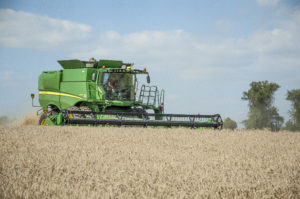 Labor for field crops is highly seasonal and historically farm labor has been difficult to attract. Larger equipment allows the farmer to carry out all the operations without having to employ someone.
Labor for field crops is highly seasonal and historically farm labor has been difficult to attract. Larger equipment allows the farmer to carry out all the operations without having to employ someone.
More comfortable cabs and GPS equipment make it more comfortable and effective for the farmer or farmworker to work long hours and ensure the precision required for each operation. Remember correct timing is everything – drilling, spraying if necessary and harvesting.
The land and machinery are the two big investments on a crop farm as there may be several hundred thousand dollars tied up in tractors, harvesters, planters etc. Farmers understand that investment in equipment is critical to remain competitive and profitable.
_______
 Duncan Allison gained degrees in horticulture and extension education in the UK and US and spent most of his career working for the DuPont Company developing and marketing crop protection chemicals. Recently he has written reports for a global ag publisher and for New Jersey-based international business consultants Kline & Co. For the last 16 years he has been heavily involved in the local farming of Chester County where he has lived with his wife and family since 1980.
Duncan Allison gained degrees in horticulture and extension education in the UK and US and spent most of his career working for the DuPont Company developing and marketing crop protection chemicals. Recently he has written reports for a global ag publisher and for New Jersey-based international business consultants Kline & Co. For the last 16 years he has been heavily involved in the local farming of Chester County where he has lived with his wife and family since 1980.
Connect With Your Community
Subscribe to stay informed!
"*" indicates required fields






















![95000-1023_ACJ_BannerAd[1]](https://vista.today/wp-content/uploads/2023/03/95000-1023_ACJ_BannerAd1.jpg)






















